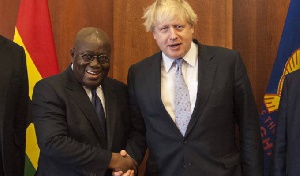The United Kingdom, as suspected after Brexit, will “do a free trade deal” with Ghana, its Foreign Secretary, Boris Johnson, said in Accra, underpinning the argument of those who felt the country should have taken Brexit into account before signing the interim Economic Partnership Agreement with the European Union.
The UK is one of Ghana’s largest trade partners in Europe, and so its exit from the EU would have implications for the numbers on which the EPA was signed.
“We see that the Brexit does matter for Ghana as UK imports from Ghana have accounted for 24.1% of EU28 imports in value and 31.8% of EU28-UK for all CTBP [processed cocoa, processed tuna, bananas and pineapples], and for respectively 27.8% and 40% in volume,” French Economist, Jacques Berthelot, argues in a paper titled: ‘Ghana's thoughtless ratification of the interim EPA, based on false data.’
“In particular, the UK accounts for 55.8% of all EU28 bananas imports from Ghana and for 53.5% of processed tuna, against 28.8% for pineapples and 9.2% for processed cocoa. This is the reason why total GSP [Generalised System of Preferences] duties to pay to the EU would be a third lower to the EU28-UK than to the EU28.”
Boris Johnson told the B&FT that Brexit offers an opportunity for the two countries to take bilateral trade “a step further,” and that “a lot of things matter both to the UK and to Ghana in terms of tourism or security. We will continue to be a powerful voice for Ghana in Europe.”
There are “plenty of ways” he said, that the economies of Ghana and the UK “can merge” together more closely.
“We talked about investment; I think one of the things that Ghana can benefit from more is financial services help here for investment going on in this country and certainly there are wonderful product pricing here in Ghana.”
Trade volumes between Ghana and UK were estimated at about a billion dollars per annum, with overall trade volume with the EU estimated to be in excess of €11 billion as at 2013.
Ghana, in August 2016, ratified the interim Economic Partnership Agreement (EPA) with the European Union, a couple of months after the Brexit vote, in a bid to enjoy duty-free and quota-free access to the EU market, whilst the EU gets 75% access to Ghana’s market.
The UK is one of the major trading partners of Ghana and their decision to leave the EU will mean that access to the UK market as part of the EPAs will not be readily available as the agreement will not be binding on an independent UK.
But the EU representative in Ghana, William Hanna, has said that Ghana would have to wait for a complete exit of the UK from the European Union, before it considers a renegotiation of the European Union.
Business News of Friday, 17 February 2017
Source: B&FT Online

















